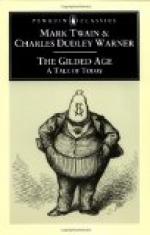Mrs. O.—“It was his right hand hind leg. Jump down, Francois dear, and show the ladies what a cruel limp you’ve got yet.”
Francois demurred, but being coaxed and delivered gently upon the floor, he performed very satisfactorily, with his “right hand hind leg” in the air. All were affected—even Laura—but hers was an affection of the stomach. The country-bred girl had not suspected that the little whining ten-ounce black and tan reptile, clad in a red embroidered pigmy blanket and reposing in Mrs. Oreille’s lap all through the visit was the individual whose sufferings had been stirring the dormant generosities of her nature. She said:
“Poor little creature! You might have lost him!”
Mrs. O.—“O pray don’t mention it, Miss Hawkins—it gives me such a turn!”
Laura—“And Hildebrand and Percy—are they—are they like this one?”
Mrs. G.—“No, Hilly has considerable Skye blood in him, I believe.”
Mrs. H.—“Percy’s the same, only he is two months and ten days older and has his ears cropped. His father, Martin Farquhar Tupper, was sickly, and died young, but he was the sweetest disposition.—His mother had heart disease but was very gentle and resigned, and a wonderful ratter.” —[** As impossible and exasperating as this conversation may sound to a person who is not an idiot, it is scarcely in any respect an exaggeration of one which one of us actually listened to in an American drawing room —otherwise we could not venture to put such a chapter into a book which, professes to deal with social possibilities.—The authors.]
So carried away had the visitors become by their interest attaching to this discussion of family matters, that their stay had been prolonged to a very improper and unfashionable length; but they suddenly recollected themselves now and took their departure.
Laura’s scorn was boundless. The more she thought of these people and their extraordinary talk, the more offensive they seemed to her; and yet she confessed that if one must choose between the two extreme aristocracies it might be best, on the whole, looking at things from a strictly business point of view, to herd with the Parvenus; she was in Washington solely to compass a certain matter and to do it at any cost, and these people might be useful to her, while it was plain that her purposes and her schemes for pushing them would not find favor in the eyes of the Antiques. If it came to choice—and it might come to that, sooner or later—she believed she could come to a decision without much difficulty or many pangs.




